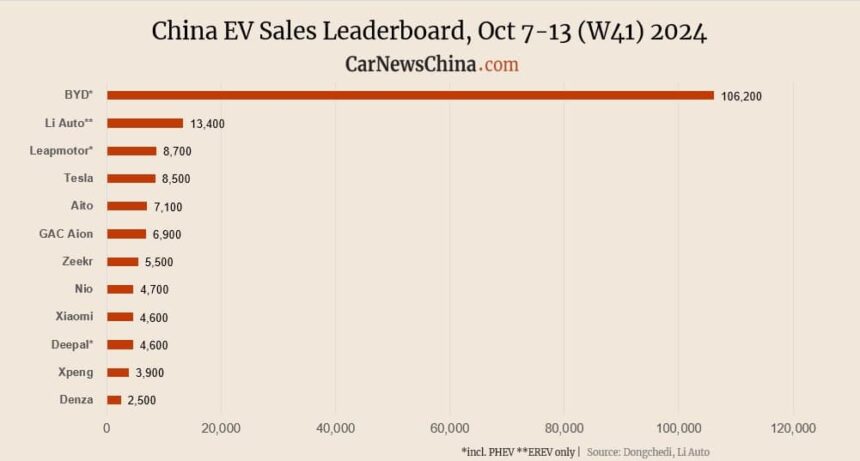By mid-October, with week 41 in full swing, China’s electric vehicle (EV) market demonstrated a decisive upward trend. NIO’s growth accelerated by 4%, while Xiaomi saw a surge of 20%. BYD expanded by a significant 60%, and Tesla experienced an enormous 370% increase, compared to the previous week.
The week ending October 13, 2024, was Week 41 of that year. As China’s Golden Week drew to a close on October 7, and with an unusual Saturday shift looming on October 12, the nation returned from its nationwide vacation to face new challenges. Week 41 in 2023, a period for year-over-year comparison, spanned from October 9 to October 15.
Li Auto publishes the company’s weekly gross sales figures, which are largely derived from insurance registration data, albeit without explicit confirmation from the company.
Chinese statistics on new energy vehicle (NEV) gross sales, which encompasses battery electric vehicles (BEVs), plug-in hybrid electric vehicles (PHEVs), and extended-range electric vehicles (EREVs). While the market is indeed inclusive of fuel cell electric vehicles (FCEVs), their sales figures remain negligible in China.
The number of weekly documents for BYD has reached an unprecedented high. By September, the company had set a new milestone by delivering an unprecedented 417,603 electric passenger vehicles.
BYD’s sales of battery-electric vehicles (BEVs) and plug-in hybrid electric vehicles (PHEVs) are shifting gears, with a notable trend emerging: last year saw more BEV deliveries than PHEV ones, but 2024 promises to be a PHEV-driven year. PHEVs (plug-in hybrid electric vehicles) have been experiencing a surge in demand at BYD, outpacing the growth of pure battery-electric vehicles (BEVs). In September, BYD reported a sales split of 40% battery-electric vehicles (BEVs) and 60% plug-in hybrid electric vehicles (PHEVs).


Li Auto reported a staggering 53,709 vehicle deliveries in September, marking a company record. On Monday, the corporation announced that its one millionth vehicle had rolled off the production line.
Li Auto exclusively markets extended-range electric vehicles (EREVs), a type of parallel plug-in hybrid electric vehicle where a small internal combustion engine generates power solely for charging the battery or driving the electric motor, but is disconnected from the wheels.
The registrations are exclusively for the NIO model, with ONVO registering last week.
In September, Nio delivered a record-breaking 21,181 vehicles, surpassing its previous all-time high of 21,209 units set in June. On September 19, Chinese electric vehicle manufacturer NIO expanded its product portfolio by introducing the Onvo L60 SUV, a new addition to its entry-level subbrand Onvo. L60 contributed 832 products to September’s deliveries.
By the end of its final week, Nio had achieved a milestone, with cumulative gross sales reaching an impressive 600,000 units. In September 2024, two years after its German market entry in 2022, Nio delivered 22 vehicles to customers.

Xiaomi saw a significant surge in interest, with 4,600 product registrations – a 21.05% increase from the previous week’s 3,800 units. Unfortunately, no comparable year-over-year data exists. Xiaomi’s latest venture into the automotive sector sees them register a significant milestone of 8,400 auto units in just one month, signaling a promising start to their foray into the industry.
Xiaomi announced that it sold 13,559 units of its SU7 electric sedan in September, and is set to increase production to exceed 20,000 units in October. Xiaomi unveiled its inaugural automotive model, the SU7, on March 28, with a goal of delivering 120,000 units in the current year.













